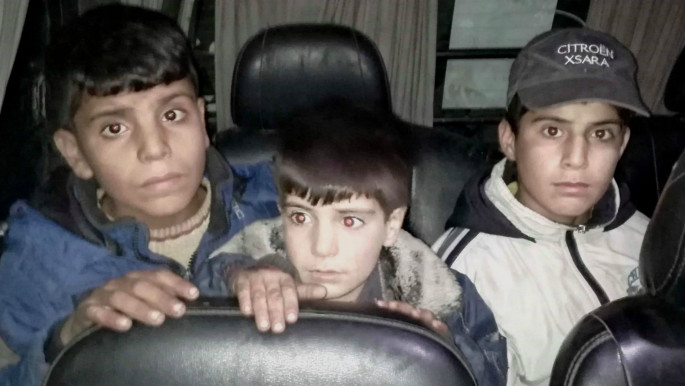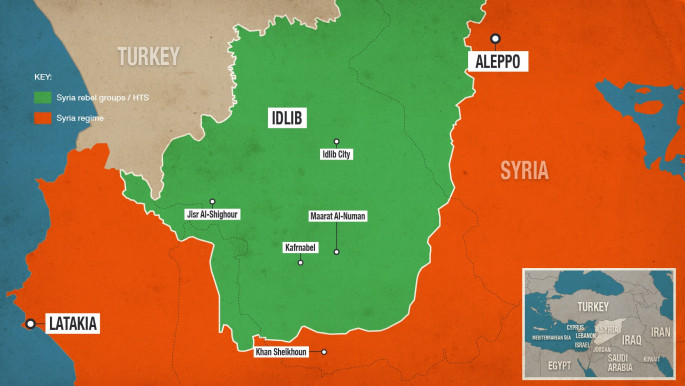Syria Weekly: Maarat Al-Numan evacuation brings new dangers for Syrians
Aid workers, civil rescue teams and volunteers braved the rat-a-tat of successive Russian air strikes and regime machine gun fire to race down the highway to southern Idlib for one of the biggest evacuations since the start of the Syria war.
The efforts of professional rescue workers and ordinary citizens alike saved thousands from death by shelling, gunfire or starvation as regime troops moved closer to Maarat Al-Numan while circling helicopters and snipers fired on civilians as they escaped the inferno.
Maarat Al-Numan had been marked out by the regime as the next target of its slow-creeping offensive in Idlib, which intensified on December 15 and reached a macabre crescendo just before Christmas.
Like other regime offensives, it began with hundreds of bombs and shells raining down on Maarat Al-Numan, forcing the population to flee or hunker down in their homes or makeshift bunkers.
The air assault had the intended effect turning Maarat Al-Numan into a ghost town with only groups of rebel fighters standing in the way of the regime capturing one of the most strategically important towns in opposition-held Idlib.
 |
Some of the displaced went to border areas with Turkey and are living in the open, without tents - Merna Alhasan, an Idlib-based journalist |
 |
"Some of the displaced went to border areas with Turkey and are living in the open, without tents," Merna Alhasan, an Idlib-based journalist told The New Arab.
"Others stayed in mosques and roads in the middle of the city, which they believe to be safer than the areas around Maarat Al-Numan that was exposed to the fierce military campaign of mass extermination and destruction."
Bombing and shelling targeted homes, rescue centres, power stations, and other critical infrastructure and as the civilian death toll mounted, the White Helmets and other aid groups decided that Maarat Al-Numan had to be completely evacuated.
"Russia and regime forces began with the same mechanism of targeting the cars of the displaced which caused a number of casualties... Even during search and rescue operations, our teams were subjected to double tap air raids and direct targeting," Mousa Al-Zidane, media coordinator at the White Helmets told The New Arab.
The 11-day bombardment displaced at least 216,000 and killed 160 people, including 40 children and 32 women, according to the civil rescue group.
"Our White Helmets teams managed to save more than 240 people under the rubble of death, including 83 children and 74 women, in addition to helping hundreds and transporting them to medical points," Zidane added.
One haunting image from the evacuation showed three Syrian children crouched in the back of a minivan, their eyes, wide in fear, staring into the camera as if for answers to the turmoil around them.
Kids Paradise, an independent NGO, received a phone call informing them of a family stranded outside Maarat Al-Numan who had found shelter from the rain under an olive tree, the crop which Idlib was once synonymous with across Syria and the region.
 |
One haunting image from the evacuation showed three Syrian children crouched in the back of a minivan, their eyes, wide in fear, staring into the camera as if for answers to the turmoil around them [Kids Paradise] |
The team dispatched a minivan to rescue the children who assumed they were returning to their homes, but when rescue workers told the children they were being evacuated they burst into tears.
Many of those left in Maarat Al-Numan in the final days of the assault did not have cars or vans to escape, so had to try and flee by foot or find shelter while a barrage of missiles, barrel bombs and shells hit the town.
One resident, Ahmad, who gave only his first name to protect his identity, said that without a vehicle, he and his family had no way of escaping Maarat Al-Numan, so they hid in his home.
When the airstrikes and shelling intensified, Ahmad and his neighbours dug holes in the ground to shelter their families, praying they would be rescued.
Ahmad counted more than 80 missiles hitting Maarat Al-Numan and the surrounding villages as he hid in the shelter, hoping the assault would subside.
"We adults were terrified and the children even more so… these days will live in their minds forever," he told The New Arab. "We did not know how we could hide our children from the shelling, we were helpless."
On Tuesday, Ahmad received a message from Kids Paradise asking him to inform them of his location and dispatched a van to rescue his family. They headed north towards the Syria-Turkey border passing towns and villages in the Idlib countryside Ahmad said he had never visited before passing waves of refugees walking or waiting for help.
"Many didn't have phones to inform rescue workers of their location, and others did not have the patience or could not endure the bombing anymore, so set off on foot," he said.
 |
| Click here to enlarge |
To highlight the reluctance of some Maarat Al-Numan's residents without money or families in other parts of Idlib to leave their homes at the start of the assault, then one only needs to look at the conditions Ahmad is now exposed to.
Amid a freezing north Syria winter, Ahmad and his family are living in a field outside a refugee camp with little more than the clothes in their backpacks. They managed to find shelter in the cellar of a partially built home, but the heavy rain has flooded parts of their room and the children have to jump over puddles and mud to reach the corner they sleep in.
"We were fortunate to have this cellar, our relatives are living under trees," he said. "Here there is relative calmness. There is no bombing which is a little strange for us because we lived in danger for so long. The only thing I want to do now, which I am unable to do, is feed my children and provide them with warmth."
Russian planes and regime snipers targeted some of the refugees as they fled on the highway. Even at the shelters, Maarat Al-Numan survivors are still not safe.
A group of displaced Syrians set up tents outside a school in an eastern Idlib village when they were targeted by a suspected Russian airstrike on Christmas Eve, killing ten refugees, including six children and three women.
Twitter Post
|
Now the White Helmets are working with aid groups to help the displaced who remain in critical situation, with thousands of refugees trying to survive the freezing Idlib winter huddled under trees or wrapped in damp blankets in open exposed fields.
Aid groups say they are trying to provide the newly displaced on the Syria-Turkey border with enough food, water and medical supplies to survive, but say they are overwhelmed by the huge numbers of displaced from Maarat Al-Numan and other regime offensives.
Kids Paradise said that camps in northern and eastern Idlib have already hit full capacity so refugees are sleeping wherever they can, which means in fields, disused buildings and orchards. Like other NGOs, Kids Paradise are already over-stretched.
They are distributing bread to families but say field ration packs would be a much better option, but due to a lack of funding they are not able to provide these staples.
They are also providing floormats to the families so they can try and keep the floor they sleep on relatively dry, but there is little that can be done to protect the children from the freezing temperatures and the heavy rain that has not ceased.
They too are watching to see of the regime advances any further north, potentially sparking another humanitarian crisis that would overwhelm the already stretched NGOs and could lead to mass starvation and disease.
"If needed, we will continue with evacuations further north. This will only be done for those with absolutely no means of transportation and once a state of emergency occurs," a worker from the NGO told The New Arab.
Ranim Ahmed, communications officer at The Syria Campaign, told The New Arab that the White Helmets, Moulham Volunteering Group, and other local NGOs and individuals are for now doing what they can but are also concerned that the regime offensive could continue.
"The main concern is that the regime and Russia continue their bombing and seize more areas in southern Idlib. We are also worried that the bombing could reach areas further north, which is densely populated, in part due to the newly displaced. The 3.5 million people in Idlib have nowhere to go to, with the Turkish borders closed," Ahmed said.
She said that funding cuts by international organisations mean that NGOs are working with little resources and at full capacity. Aerial attacks have made Idlib at risk of further massacres with nine such cases committed by Russia and the regime during the Maarat Al-Numan offensive.
"Civilians in Idlib are at high-risk given [Russia's] targeting of medical facilities and civil defence centres," Ahmed said.
"Medical, rescue and humanitarian workers are being deliberately targeted from the air in the centres and in ambulances."
All eyes are now on where the regime will target next, knowing that another assault on a populated town could lead to an unprecedented humanitarian crisis.
Paul McLoughlin is a news editor at The New Arab.
Follow him on Twitter: @PaullMcLoughlin





 Follow the Middle East's top stories in English at The New Arab on Google News
Follow the Middle East's top stories in English at The New Arab on Google News


